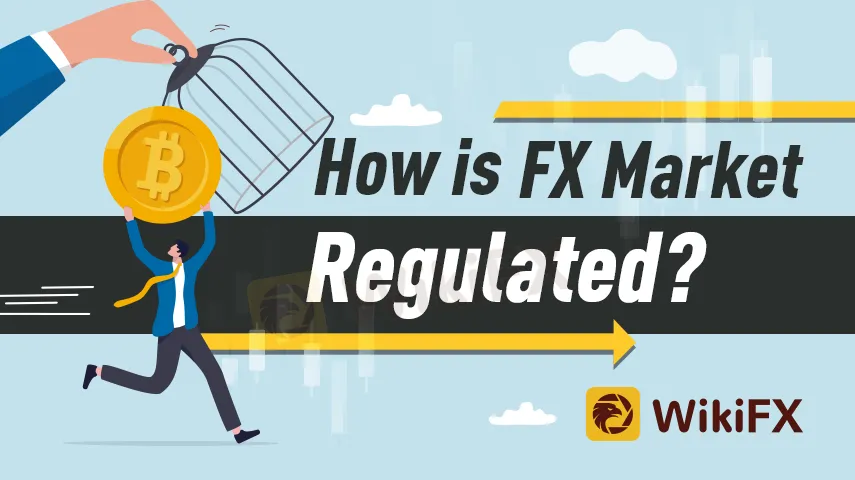简体中文
繁體中文
English
Pусский
日本語
ภาษาไทย
Tiếng Việt
Bahasa Indonesia
Español
हिन्दी
Filippiiniläinen
Français
Deutsch
Português
Türkçe
한국어
العربية
How is Forex Market Regulated?
Abstract:The forex market is the largest and most liquid market that remains open 24 hours a day and five days a week. With a daily turnover of over $8 trillion, the forex market requires oversight from regulatory bodies across the world to keep the market functioning in a transparent manner. Regulatory supervision strengthens the trust and confidence of traders in the forex system, allowing more traders to join the forex market and facilitating trade worldwide. In this article, we will discuss how the forex market is regulated at such a large scale.

The forex market is the largest and most liquid market that remains open 24 hours a day and five days a week. With a daily turnover of over $8 trillion, the forex market requires oversight from regulatory bodies across the world to keep the market functioning in a transparent manner. Regulatory supervision strengthens the trust and confidence of traders in the forex system, allowing more traders to join the forex market and facilitating trade worldwide. In this article, we will discuss how the forex market is regulated at such a large scale.
Regulatory bodiesThe foreign exchange market is comparatively less regulated than stock or commodity exchange markets due to its decentralized nature, which makes it vulnerable to fraud. However, to safeguard the interests of traders and facilitate trading activities, governments all over the world regulate forex brokers through regulatory bodies. The supervisory bodies act as watchdogs and issue licenses to the forex brokers that comply with the local rules and regulations. Some famous regulatory bodies that oversee the operations of forex brokers in their respective countries are:
1- Financial Conduct Authority (United Kingdom)
2- National Futures Association & Commodity Futures Trading Commission (United States)
3- Australian Securities and Investments Commission (Australia)
4- Autorité des marchés financiers (France)

Regulated forex brokers have to fulfill the following main regulatory requirements:
1- Regulated forex brokers should not combine the funds of their clients with the funds meant to run the operations of the company. In other words, the broker has to segregate the clients and its own funds by maintaining separate bank accounts.
2- Regulated brokers must disclose the risks associated with forex trading and must refrain from making false promises about generating guaranteed or high returns.
3- Regulated brokers have to maintain minimum capital requirements determined by the local regulatory bodies to ensure that the broker remains solvent and can handle the deposits of their clients.
4- Regulated brokers are frequently audited to detect and prevent any financial irregularity that can inflict financial loss to traders. The brokers have to meet capital adequacy requirements and ensure compliance by submitting the statements periodically to the regulators.

Not all brokers are regulated and licensed. To keep yourself safe from forex fraud, you must open your trading account with a regulated and licensed broker only. While you can browse the websites of brokers individually and verify the details on the regulator's website, you can find a list of regulated brokers on Wikifx.com.
Wikifx.com covers a mammoth list of 5,000 brokers across 30 countries, making it easier for you to filter the regulated brokers according to your defined criteria. You can find license numbers, regulatory information, risk appraisal, and up-to-date rankings of forex brokers. The details of the brokers can be viewed on Wikifx.com as well as on the mobile app.
Disclaimer:
The views in this article only represent the author's personal views, and do not constitute investment advice on this platform. This platform does not guarantee the accuracy, completeness and timeliness of the information in the article, and will not be liable for any loss caused by the use of or reliance on the information in the article.
Read more

Trading Psychology – 4 Wise Quotes From The Legendary Mark Douglas
In the world of trading, few books have had the impact of Mark Douglas’ big hit Trading in the Zone. Written almost two decades ago, the book has become a must-read for traders looking to elevate their game to legendary status. While there is so much wisdom to be found in the book, we’ve compiled 5 of the best quotes about trading psychology that every trader should read.

EUR/USD Forecast: New lows ahead of the weekend? ECB, covid and technical all point lower.
Optimism has been weighing on the safe-haven dollar – but not against the euro. The common currency's failure to recover is a sign of weakness that could be followed with falls to fresh lows once the mood sours again – and there are reasons to expect that to happen sooner rather than later.

EURJPY WEEKLY FORECAST. Price Likely To Rise Above 131.000.
The price of EURJPY has been on a steady rise ever since it made a low of 128.808. Other currencies collapsed against the Japanese Yen two weeks ago.

AUD Is Weak Under All-rounded Pressure
A rise in the wake of a fall was seen by DXY last week ascribed to the uncertain time of delisting caused by the Federal Reserve (Fed). However, the reason for the rally of DXY last Friday is the vigorous growth of personal consumption expenditures (PCE) released by the U.S. Bureau of Economic Analysis (BEA).
WikiFX Broker
Latest News
Investment Scam Alert: FCA Identifies 15 Scam Brokers
Exploring Laxmii Forex: Kharadi's Financial Hub
BaFin Issues Consumer Alerts Against Unauthorised Platforms
Retired Man Loses Life Savings to ‘Sister Duo’ in Forex Scam
Telegram vs WhatsApp vs Discord: Which Platform Is Best for Forex Signals?
TradexMarkets: 5 Troubling Signs You Shouldn’t Ignore
A Guide to Buy Stop vs Buy Limit in Forex Trading
SEC Implements New Rules for Crypto-Asset Service Providers
Binance Users Convert Crypto and Withdraw Instantly to Mastercard
Forex Swaps Explained in 5 Minutes – Everything You Need to Know
Currency Calculator


